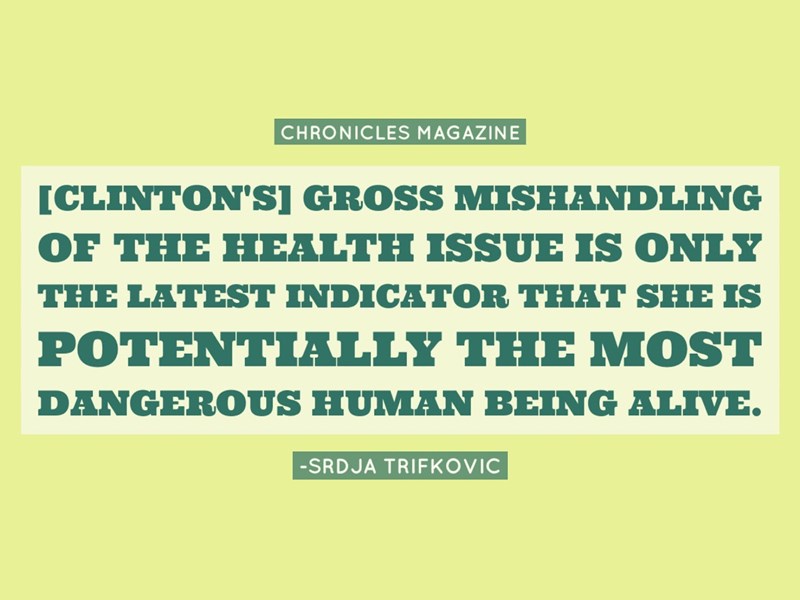According to Hillary Clinton’s campaign talking points, she wanted to “power through” her pneumonia; but after that “overheating episode” on September 11 it “seemed like the smart thing to do” to take some downtime. According to Politico.com, which obtained the document, “those phrases, projecting strength, prudence, and vigor, were among the six bullet-pointed talking points about Clinton’s health the campaign distributed to its army of outside surrogates Tuesday morning.” They were part of the “Daily Message Guidance” from her Brooklyn headquarters:
To anyone who knows Hillary, it does not come as much of a surprise that even when she’s under the weather, she would want to power through her normal schedule . . . This is the Hillary Clinton America saw as secretary of state: someone who traveled the world at a breakneck pace, tirelessly representing America abroad . . . [She] has more than met the standard set four years ago by President Obama and Mitt Romney in terms of disclosing details about her health.
The implications of this episode for the potential commander-in-chief are dire. When faced with a sudden challenge (in this case pneumonia diagnosed on September 9, assuming that was indeed the real problem), an able strategist will make an assessment that will consider likely costs and benefits of any given course of action. To “power through” was an irrational decision discretely made by Mrs. Clinton, without prior consultation with her advisors (who were apparently kept in the dark) and contrary to expert advice (her doctor had advised immediate rest). It was a high-risk course which reflected Mrs. Clinton’s preference for the possibility of strategically perilous outcome (her Sunday collapse and the ensuing legitimization of questions about her health) rather than the acceptance of tactical defeat which would have entailed payment of limited price (full disclosure of the facts of the case, taking a few days off right away).

There are numerous parallels in history, mostly alarming or outright disastrous. Two will suffice to illustrate the problem. “Powering through” is the secular, New Age-motivational equivalent of “God will provide,” which was Philip II’s standard response to the warnings that Spain was overextended in its military-political commitments—against England, France, the Netherlands, the Ottomans. Towards the end of his reign, to pleas from the Cortes of Castille that the burden was no longer bearable, he replied that “they should and must put their trust in me . . . [T]hey are never, on any pretext, to come to me with such a suggestion again.” But in the end it turned out that God was not Spanish, and therefore Spain was doomed to failure. His messianic imperialism prompted him to power through against reason and prudence, and after 1588, for all the money and men deployed, “and for all the prayers and devotions offered, the strategic miracles ceased.”
An even more extreme variety of “powering through” was Hitler’s insistence that the “national socialist spirit”—a force-idea par excellence—would triumph over quantitatively superior foes. (Towards the end he also invoked “God the Almighty [Who] has made our nation. By defending its existence we are defending His work . . . Only He can relieve me of this duty Who called me to it.”) Invoking the Geist he, too, disregarded expert advice (his generals’ warnings that the Barbarossa was seriously underpowered, in the spring of 1941; that the Sixth Army should stage a fighting withdrawal from the Stalingrad pocket in December 1942; that the Eastern Front should be radically shortened, after the battle of Kursk in the summer of 1943; etc). He, too, preferred the risk of strategic defeat (e.g. reinforcing failure in Tunisia in early 1943) to the unpleasant but non-catastrophic alternative (evacuating the Afrika Korps to Italy). He, too, tried to present irrational faith in his own ability to overcome adversity as a source of strength and vigor, pledging to fight until “five past twelve.”
Hillary Clinton is a messianic imperialist ready to take risks disproportionate to rewards, but unable and unwilling to take responsibility for the consequences (Benghazi), or to admit any serious wrongdoing (private server). Her gross mishandling of the health issue is only the latest indicator that she is potentially the most dangerous human being alive.
Leave a Reply